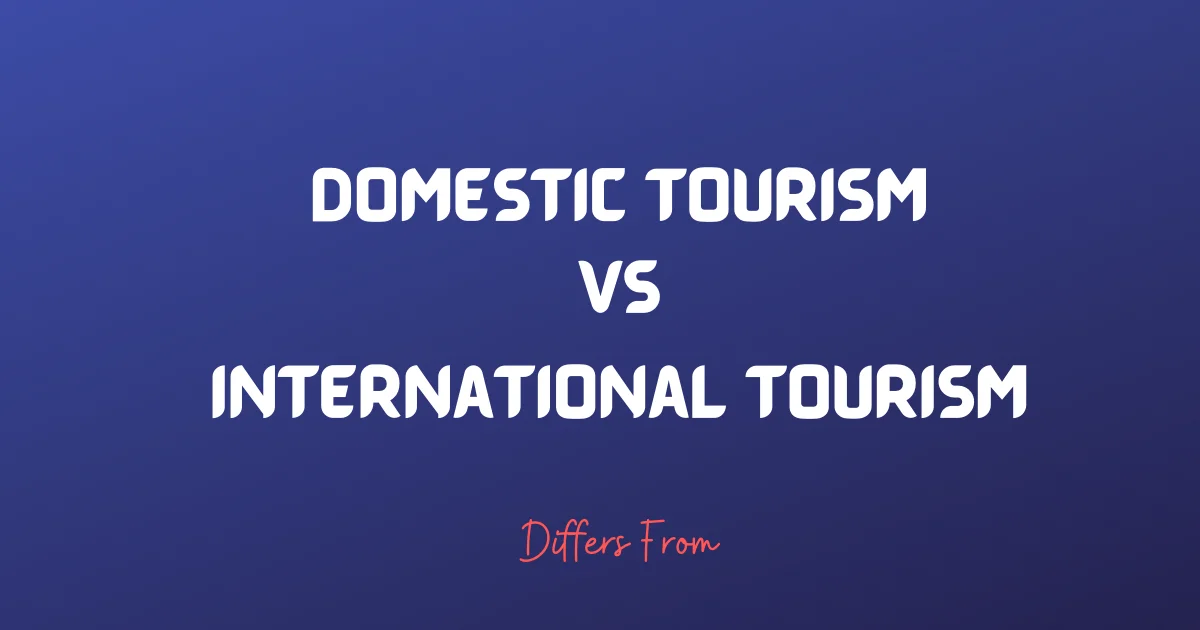Tourism is travel for leisure or business purposes. Domestic tourism is tourism within a country’s borders, while international tourism includes trips to foreign countries. The domestic and international tourism industries are important to the global economy, but they have different characteristics.
In this article, we discuss the difference between Domestic and International Tourism in detail with examples.
What is tourism?
Tourism is the act of travel for leisure, recreation, or business purposes. It is a global industry that generates billions of dollars in revenue each year. Many countries rely on tourism as a main source of income, and it supports millions of jobs worldwide. There are different types of tourism, such as cultural tourism, eco-tourism, and medical tourism.
Domestic tourism
According to the World Tourism Organization, domestic tourism is “traveling within one’s own country.” Domestic tourism can be a great way to explore your own country and learn more about its history, culture, and people. It can also be a fun way to spend time with family and friends. There are many different types of domestic tourism, including camping, fishing, hiking, birdwatching, and wine-tasting.
Some examples include tourist attractions such as amusement parks and beaches located in a person’s home state or province. Other types of domestic tourism include:
- Traveling to visit friends and family who live near the traveler.
- Explore new provinces or states that have not been visited before.
- Participating in cultural activities unique to a region.
International tourism
International tourism is the sum of all travel that crosses international borders. It includes travel by residents of one country to another country and by non-residents traveling in and through other countries. It does not include domestic tourism within a single country.
The UNWTO defines international tourism as “the activity of persons traveling to and staying in places outside their usual environment for not more than one consecutive year for leisure, business or other purposes.” It is estimated that international tourist arrivals reached 1.2 billion in 2012, generating US$1.4 trillion in receipts. This makes international tourism one of the world’s largest industries.
Many jobs are supported by the industry, including hotels, airlines, restaurants, and retail shops.
Difference between Domestic and International Tourism
The international tourism industry is more centralized than the domestic tourism industry. Most of the world’s top tourist destinations are located in a few countries: France, Spain, Italy, China, and Japan. These countries welcome a large number of international tourists every year.
| Particulars | Domestic Tourism | International Tourism |
| Destination | trips within a country’s borders | trips to foreign countries |
| Nationality | Traveled by national citizen | Traveled by a foreign citizen. |
| Legal Documents | Legal documents are optional | Legal documents are essential. |
| Income | Promote local business and circulate money within the country | Promote business within the country and bring foreign remittance |
| New cultures and languages | Experience own culture | Experience new culture and language |
| Expenses | More affordable | More costly |
| Economic Benefit | Less for the destination country | Huge for the destination country |
Key Difference between Domestic and International Tourism
In brief, the key differences between the two types of tourism:
– Domestic tourism is typically more affordable than international tourism.
– Domestic tourists tend to stay in hotels and resorts rather than living in a foreign country as international tourists do.
– Domestic tourism often reflects the culture of the destination country, while international tourism often features more modern tourist attractions.
– Domestic tourists may also enjoy experiencing the local cuisine and customs more than international tourists.
Why do People prefer Domestic tourism more?
Domestic tourism has several advantages over international tourism:
- It is usually much cheaper because people travel within their own country.
- It is more convenient because people can stay closer to home and don’t have to worry about obtaining visas or dealing with foreign languages and cultures.
- It supports the local economy by providing jobs and generating revenue.
- Domestic tourists often have a better understanding of the local culture.
However, international tourism is much more exciting because it offers the opportunity to travel to different countries and cultures. It also provides tourists with a broader range of personal growth and self-discovery opportunities.
What you should consider before Domestic or International Tourism?
Necessary Documents
There are many necessary documents required for both domestic tourism and international tourism. Some of the most important documents for domestic tourism include a passport, driver’s license, or state-issued identification card. For international tourism, a passport is always required and a visa depending on the destination country. Other necessary documents may include tickets, hotel reservations, and proof of insurance. It is important to check with the embassy or consulate of the destination country to ensure you have all the required documents before departing for your trip.
Accommodation and Flights
The tourism industry is a booming business, with people traveling to different parts of the world to see new and amazing places. There are many different aspects to consider when planning a trip, such as accommodation and flights.
There are many options for accommodation when traveling, from camping and hostels to hotels and resorts. It is important to research the different options to find the best fit for your needs and budget.
Flights can also be a major expense when traveling, so it is important to compare prices and book in advance. Many websites offer discounts on flights, so it is worth comparing prices before booking.
By planning and doing some research, it is possible to have a great trip without breaking the bank.
Travel Insurance
Travel insurance is an important consideration for both domestic and international tourism. For domestic trips, travel insurance can provide coverage for losses due to cancellations or interruptions of your trip and injuries or illnesses that occur while you are away from home. Travel insurance can provide coverage for lost or stolen baggage, medical expenses, and trip cancellations or interruptions for international trips. It is important to read the policy carefully to understand what is covered and what is not.
New cultures and languages
With domestic tourism, people typically stay within their own country and experience that country’s culture. With international tourism, people often go to different countries and experience various cultures. This can be good or bad, depending on what someone is looking for in their holiday experience.
The benefits of Domestic Tourism
Traveling to new and different places is always a great way to learn about the world and experience different cultures, but it can also be expensive. Domestic tourism is a great alternative for those who want to explore their own country without breaking the bank. There are many benefits of domestic tourism, including:
1. Saving money – Traveling within your own country is often much cheaper than traveling internationally. This can allow you to visit more places and spend longer in each destination.
2. Variety – There are many different places to see in the United States and Canada, each with its unique history, culture, and landscape. From the beaches of California to the Rocky Mountains of Colorado, there is something for everyone.
3. Easier travel – Unlike international travel, domestic travel is much easier and less complicated.
4. Local experience – Many domestic travel opportunities allow you to interact with locals and experience what it’s like to live in your own country.
5. Social networking – Traveling domestically offers you a great opportunity to meet new people and build friendships within your community.
The benefits of international tourism
It is said that variety is the spice of life. This may be especially true when it comes to travel, as people have an innate desire to explore new places and experience different cultures. In today’s increasingly globalized world, international tourism has become a more popular way. There are many benefits to international tourism, both for travelers and the destination country.
For travelers, international tourism offers opportunities to see the world and learn about other cultures. It can also be a way to make new friends from all over the globe. Additionally, international tourism can help people expand their horizons and learn new things about themselves.
For destination countries, international tourism provides economic benefits in jobs and revenue. It also helps promote cultural awareness and understanding among people from different countries. By supporting local businesses and spending money on the local economy, tourists help create jobs and support the country’s growth. Tourism can bring various economic benefits to the countries that tourists visit. Spending money in local economies increases the demand for goods and services. This increase in demand makes it easier for businesses to sell their products and services.
Conclusion
The difference between domestic tourism and international tourism is vast. Domestic tourism refers to travel within a country’s borders, while international tourism refers to travel outside of one’s home country. Domestic tourists are more likely to visit friends and family, while international tourists are more likely to explore new places. Domestic tourists also tend to be wealthier than international tourists, leading to different types of experiences.

